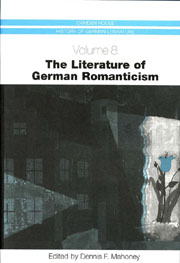Book contents
- Frontmatter
- Contents
- Illustrations
- Acknowledgments
- Abbreviations
- Introduction
- From “Romantick” To “Romantic”: The Genesis of German Romanticism in Late Eighteenth-Century Europe
- Goethe and the Romantic
- Early Romanticism
- From Goethe's Wilhelm Meister to anti-Meister Novels: The Romantic Novel between Tieck's William Lovell and Hoffmann's Kater Murr
- Tales of Wonder and Terror: Short Prose of the German Romantics
- The Romantic Drama: Tieck, Brentano, Arnim, Fouqué, and Eichendorff
- German Romantic Poetry in Theory and Practice: The Schlegel Brothers, Schelling, Tieck, Novalis, Eichendorff, Brentano, and Heine
- The Turn to History and the Volk: Brentano, Arnim, and the Grimm Brothers
- History and Moral Imperatives: The Contradictions of Political Romanticism
- Romanticism and Natural Science
- Gender Studies and Romanticism
- The Romantic Preoccupation with Musical Meaning
- Romanticism and the Visual Arts
- Goethe's Late Verse
- The Reception of German Romanticism in the Twentieth Century
- Works Cited
- Notes on the Contributors
- Index
Early Romanticism
Published online by Cambridge University Press: 05 February 2013
- Frontmatter
- Contents
- Illustrations
- Acknowledgments
- Abbreviations
- Introduction
- From “Romantick” To “Romantic”: The Genesis of German Romanticism in Late Eighteenth-Century Europe
- Goethe and the Romantic
- Early Romanticism
- From Goethe's Wilhelm Meister to anti-Meister Novels: The Romantic Novel between Tieck's William Lovell and Hoffmann's Kater Murr
- Tales of Wonder and Terror: Short Prose of the German Romantics
- The Romantic Drama: Tieck, Brentano, Arnim, Fouqué, and Eichendorff
- German Romantic Poetry in Theory and Practice: The Schlegel Brothers, Schelling, Tieck, Novalis, Eichendorff, Brentano, and Heine
- The Turn to History and the Volk: Brentano, Arnim, and the Grimm Brothers
- History and Moral Imperatives: The Contradictions of Political Romanticism
- Romanticism and Natural Science
- Gender Studies and Romanticism
- The Romantic Preoccupation with Musical Meaning
- Romanticism and the Visual Arts
- Goethe's Late Verse
- The Reception of German Romanticism in the Twentieth Century
- Works Cited
- Notes on the Contributors
- Index
Summary
In hisKritische Fragmente (1797) Friedrich Schlegel asserts: “So lange der Künstler erfindet und begeistert ist, befindet er sich für die Mitteilung wenigstens in einem illiberalen Zustande” (So long as the artist is inventing and is inspired, he finds himself at least for the purposes of communication in an illiberal state; KFSA, 2: 151). Such mental indiscipline, he argues, blinds those who indulge in it to the value of self-limitation, the ultimate ideal not only for the artist, but also for all human beings. A similar line of argument occurs in Novalis's novel Heinrich von Ofterdingen (1802). Klingsohr, the benevolent father of Heinrich's beloved and his mentor in the craft of poetry, advises his pupil that “Begeisterung ohne Verstand ist unnütz und gefährlich” (Inspiration without intellect is useless and dangerous); and he adds emphatically that “Der junge Dichter kann nicht kühl, nicht besonnen genug sein […] Es wird ein verworrnes Geschwätz, wenn ein reißender Sturm in der Brust tobt, und die Aufmerksamkeit in eine zitternde Gedankenlosigkeit auflöst” (The young poet cannot be cool and circumspect enough […] Confused chatter ensues when a violent storm is raging in the breast and dissolves attentiveness into quivering lack of thought; NS, 1: 281). Thus, both Schlegel and Novalis suggest that inspiration, if not checked and balanced, results only in distraction and frustrates properly thoughtful communication. Inspiration has to be contained and even negated by the contrary impulse of rationality, by self-awareness and self-regulation.
- Type
- Chapter
- Information
- The Literature of German Romanticism , pp. 61 - 78Publisher: Boydell & BrewerPrint publication year: 2003

